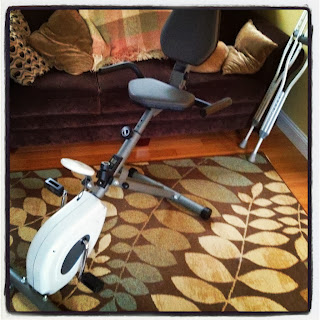I've been angry. Really, really angry. At just about everything. And guess who I've been taking it mostly out on? Those people that have the misfortune to live with me and take care of me - my husband and kiddos. Mostly my husband. You see, yesterday the office called to schedule my MRI, they gave me a 7:45 am. appointment this Friday. As we had been told it would take 7-10 days to get an appointment (and this was only 5) I was happy. I knew it was early, but I called my neighbor to ask if she could watch my daughter and put her on the bus, and my son's preschool to drop him off early. Called the elementary school. All arrangements - no problem. And then I told my husband. In the two second pause before his lukewarm reaction of "Ok", I saw it. Saw how it was inconvenient. It didn't fit into his schedule. He'd have to get the kids up earlier. And I was livid. He tried to save it by saying "I just wish you didn't have to go through this", but the damage, in my mind, was done.
All day today whenever he's come to check on me its been with the careful smiles and solicitude of a person who's not sure if their patient is going to burst into tears, bite their hand, or throw something at them. He's been great. Finally before dinner he sat down and basically asked me what the heck was going on. Was I nervous about the MRI? No. Mad? Yes. Very very mad. At the same time, understanding that I shouldn't be that upset and that yes I was feeling pretty down.
Jedi then made the best suggestion ever. Since it's still early, do you want to go to the gym? YES!! So we fed the kids, I scribbled a workout on my hand, and off we went. Jedi would watch the munchkins up in the kid gym while I swam. I posted a status that I was going, to have Coach Sheriff comment to "kill that 300". You got it. Coach is watching.
 The pool in the evening is very different than my usual early morning sessions. For one, it's dark outside. Big glass windows of dark. I got there at 6, when most people are eating dinner, so it was just me and the seniors water fitness class. I did my warmup. I floundered through my drills. I am not the most dedicated swimmer - in fact today might be the first day I've actually finished a swim workout. I had a very comical moment where I couldn't reach my water bottle which I'd placed on the starting block. Several jumps, pulling self up, falling back into pool, etc. and the 16 year old lifeguard came over and asked if I need help just as I finally got it. I'm sure I looked like a wetter version of Scrat from Ice Age with his acorn. Then I got into the workout set - my 300 endurance swim. I was tired. My foot hurt even from the force of the water flowing by it. About the 3rd lap, I started to get really, really mad. Shouting in my head - at my husband (what do you mean inconvenient! it's not convenient for me either!), and my kids (I know it's past your bedtime - suck it up buttercups Mommy needs to finish!), the medical system in this country. My job. The list went on for several more laps, until I was spent. All of my anger was left behind in the water. As I cooled down with shaking muscles, I felt calm and tremendously grateful. That is what exercise is for - to let you bleed and sweat out every last negative feeling you have until you are physically, mentally, and emotionally released. It is wonderful.
The pool in the evening is very different than my usual early morning sessions. For one, it's dark outside. Big glass windows of dark. I got there at 6, when most people are eating dinner, so it was just me and the seniors water fitness class. I did my warmup. I floundered through my drills. I am not the most dedicated swimmer - in fact today might be the first day I've actually finished a swim workout. I had a very comical moment where I couldn't reach my water bottle which I'd placed on the starting block. Several jumps, pulling self up, falling back into pool, etc. and the 16 year old lifeguard came over and asked if I need help just as I finally got it. I'm sure I looked like a wetter version of Scrat from Ice Age with his acorn. Then I got into the workout set - my 300 endurance swim. I was tired. My foot hurt even from the force of the water flowing by it. About the 3rd lap, I started to get really, really mad. Shouting in my head - at my husband (what do you mean inconvenient! it's not convenient for me either!), and my kids (I know it's past your bedtime - suck it up buttercups Mommy needs to finish!), the medical system in this country. My job. The list went on for several more laps, until I was spent. All of my anger was left behind in the water. As I cooled down with shaking muscles, I felt calm and tremendously grateful. That is what exercise is for - to let you bleed and sweat out every last negative feeling you have until you are physically, mentally, and emotionally released. It is wonderful.On the way home, Jedi also explained that my MRI will be the morning after Halloween, and if the Socks don't win tomorrow, the morning after Game Seven of the World Series. So it's possible that he'll be functioning on about four hours of sleep. Alright - for all of those reasons, I'll forgive him that two second delayed response. All is well in our house again.
Tomorrow night an awesome friend is coming to pick me and my daughter up and bring us (oh yes) to a bar. My little girl got in a habit of coming to Zumba class with me and my girlfriends and then out for drinks after this past spring. She likes the Shirley Temples. She's requested to go out with "Mommy's grown up girlfriends". It is good friend indeed that will not only join you to bar hop with a kindergartner, but will also drive. I'm grateful to have those friends. Don't worry - we'll go before the game starts.
 |
| My best drinking buddies |
P.S. For those that can't read my handwriting (get it? HAND writing????) tonight's 1100 meter workout was:
- Warmup: 6x50 with :30 rest
- Drills: 4x100 with :30 rest, broken into 25 scull/25 swim/25 fist or fingertip drag/25 pull
- Main set: 300 endurance
- Cooldown: 1x100 easy




















































